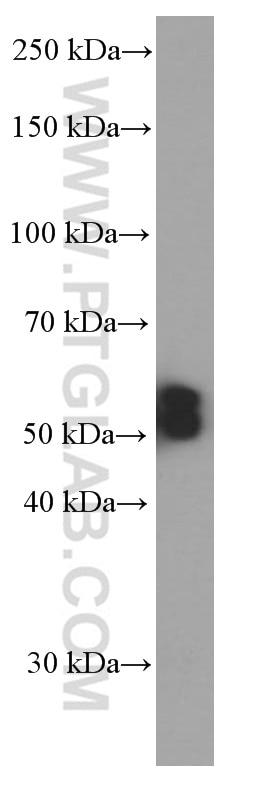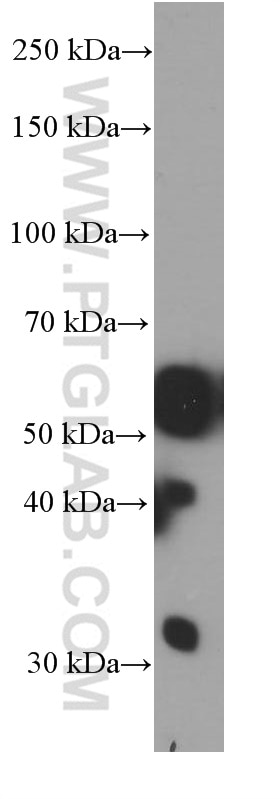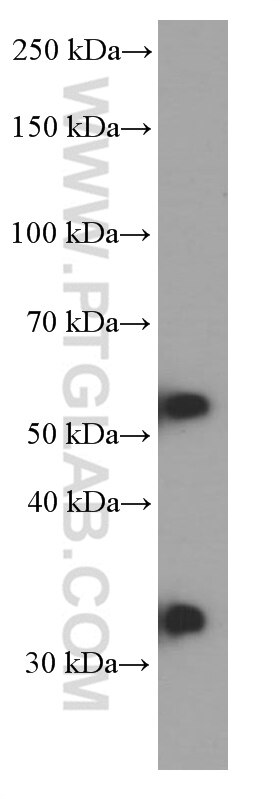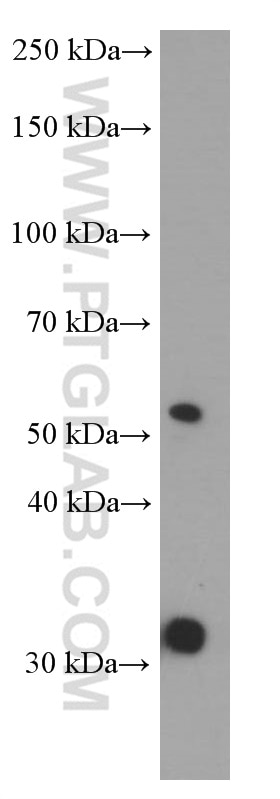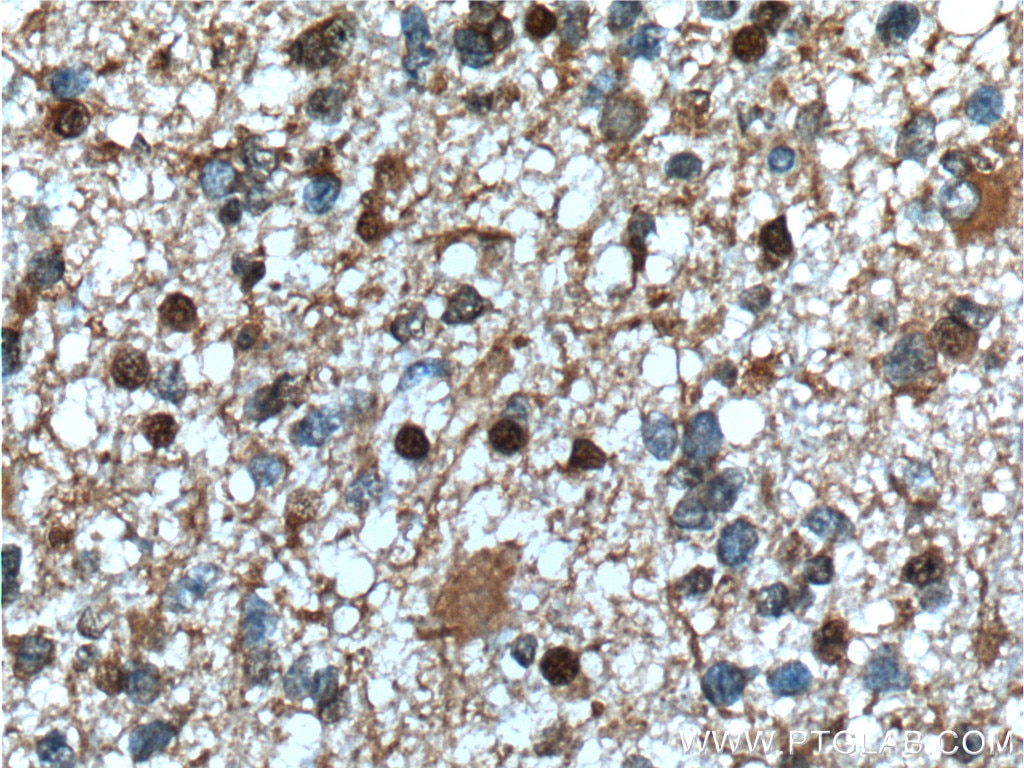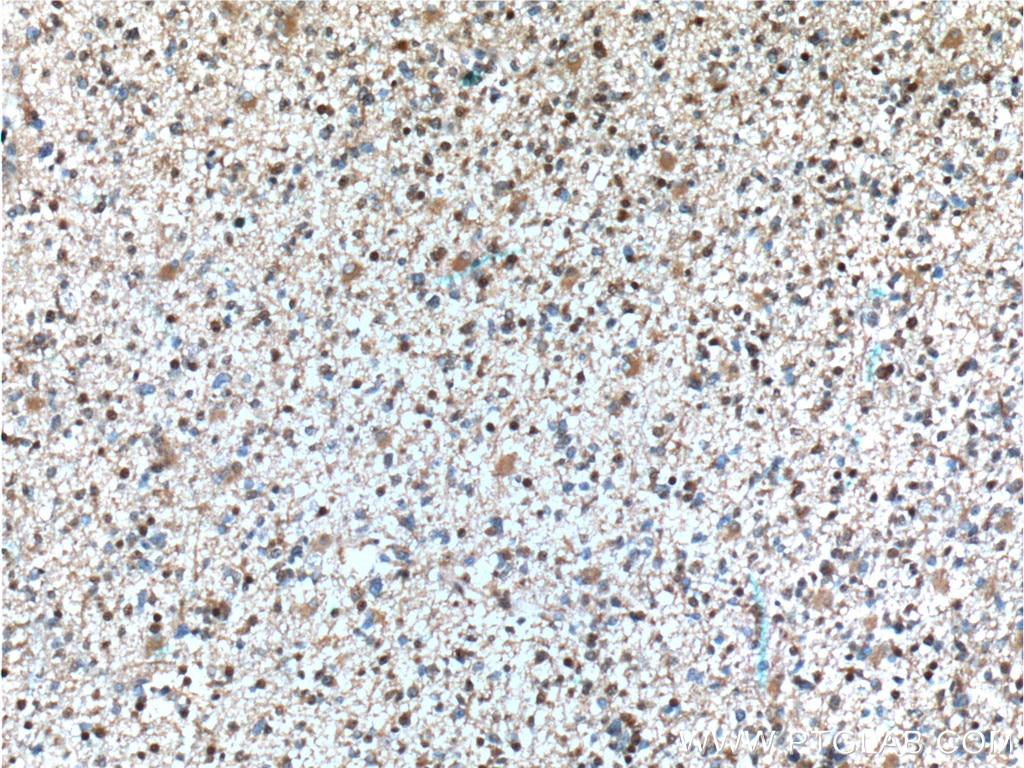PHF10 Monoklonaler Antikörper
PHF10 Monoklonal Antikörper für IHC, WB,ELISA
Wirt / Isotyp
Maus / IgG1
Getestete Reaktivität
human, Maus
Anwendung
WB, IHC, IF, CoIP, ELISA
Konjugation
Unkonjugiert
CloneNo.
4D4C6
Kat-Nr. : 66341-1-Ig
Synonyme
Galerie der Validierungsdaten
Geprüfte Anwendungen
| Erfolgreiche Detektion in WB | fetales humanes Hirngewebe, HEK-293-Zellen, Neuro-2a-Zellen |
| Erfolgreiche Detektion in IHC | humanes Gliomgewebe Hinweis: Antigendemaskierung mit TE-Puffer pH 9,0 empfohlen. (*) Wahlweise kann die Antigendemaskierung auch mit Citratpuffer pH 6,0 erfolgen. |
Empfohlene Verdünnung
| Anwendung | Verdünnung |
|---|---|
| Western Blot (WB) | WB : 1:500-1:2000 |
| Immunhistochemie (IHC) | IHC : 1:50-1:500 |
| It is recommended that this reagent should be titrated in each testing system to obtain optimal results. | |
| Sample-dependent, check data in validation data gallery | |
Veröffentlichte Anwendungen
| WB | See 1 publications below |
| IF | See 1 publications below |
| CoIP | See 1 publications below |
Produktinformation
66341-1-Ig bindet in WB, IHC, IF, CoIP, ELISA PHF10 und zeigt Reaktivität mit human, Maus
| Getestete Reaktivität | human, Maus |
| In Publikationen genannte Reaktivität | human, Maus |
| Wirt / Isotyp | Maus / IgG1 |
| Klonalität | Monoklonal |
| Typ | Antikörper |
| Immunogen | PHF10 fusion protein Ag19096 |
| Vollständiger Name | PHD finger protein 10 |
| Berechnetes Molekulargewicht | 408 aa, 46 kDa |
| Beobachtetes Molekulargewicht | 56 kDa, 35 kDa |
| GenBank-Zugangsnummer | BC020954 |
| Gene symbol | PHF10 |
| Gene ID (NCBI) | 55274 |
| Konjugation | Unkonjugiert |
| Form | Liquid |
| Reinigungsmethode | Protein-G-Reinigung |
| Lagerungspuffer | PBS mit 0.02% Natriumazid und 50% Glycerin pH 7.3. |
| Lagerungsbedingungen | Bei -20°C lagern. Nach dem Versand ein Jahr lang stabil Aliquotieren ist bei -20oC Lagerung nicht notwendig. 20ul Größen enthalten 0,1% BSA. |
Hintergrundinformationen
PHF10, also named as BRG1-associated factor 45a, is a 498 amino acid protein, which locate in the nucleus and Belongs to the SAYP family. PHF10 Involve in transcription activity regulation by chromatin remodeling. It Belongs to the neural progenitors-specific chromatin remodeling complex (npBAF complex) and is required for the proliferation of neural progenitors. During neural development a switch from a stem/progenitor to a post-mitotic chromatin remodeling mechanism occurs as neurons exit the cell cycle and become committed to their adult state. The transition from proliferating neural stem/progenitor cells to post-mitotic neurons requires a switch in subunit composition of the npBAF and nBAF complexes. As neural progenitors exit mitosis and differentiate into neurons, npBAF complexes which contain ACTL6A/BAF53A and PHF10/BAF45A, are exchanged for homologous alternative ACTL6B/BAF53B and DPF1/BAF45B or DPF3/BAF45C subunits in neuron-specific complexes (nBAF). The npBAF complex is essential for the self-renewal/proliferative capacity of the multipotent neural stem cells. The nBAF complex along with CREST plays a role regulating the activity of genes essential for dendrite growth. PHF10 exists as several isoform and the calculated molecular weight of each isoform is 42 kDa, 37 kDa, 51 kDa, and 56 kDa.
Protokolle
| Produktspezifische Protokolle | |
|---|---|
| WB protocol for PHF10 antibody 66341-1-Ig | Protokoll herunterladen |
| IHC protocol for PHF10 antibody 66341-1-Ig | Protokoll herunterladen |
| Standard-Protokolle | |
|---|---|
| Klicken Sie hier, um unsere Standardprotokolle anzuzeigen |
Publikationen
| Species | Application | Title |
|---|---|---|
Glia DHHC5 facilitates oligodendrocyte development by palmitoylating and activating STAT3. | ||
bioRxiv BRD9-SMAD2/3 orchestrates stemness and tumorigenesis in pancreatic ductal adenocarcinoma | ||
Gastroenterology BRD9-SMAD2/3 orchestrates stemness and tumorigenesis in pancreatic ductal adenocarcinoma |
